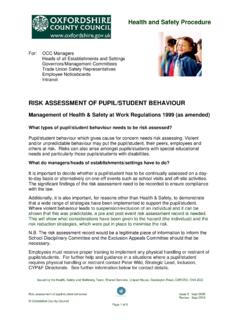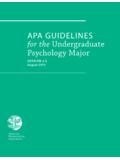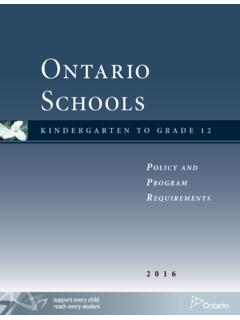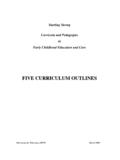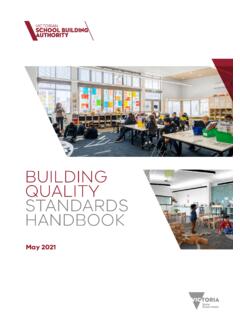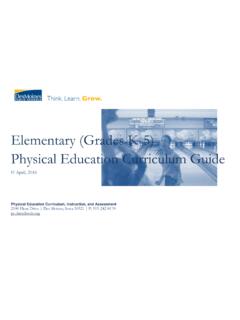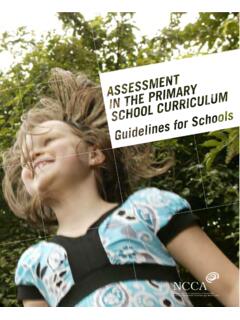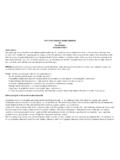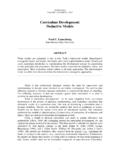Transcription of National curriculum PSHE Key stages 1–4
1 National curriculum PSHE. Key stages 1 4. Sex and relationship education, healthy lifestyles and financial capability Teacher's handbook for the units of work QCA wishes to make its publications widely accessible. Please contact us if you have any specific accessibility requirements. First published in 2005. Qualifications and curriculum Authority 2005. ISBN: 1-85838-807-4. Reproduction, storage, adaptation or translation, in any form or by any means, of this publication is prohibited without prior written permission of the publisher, unless within the terms of licences issued by the Copyright Licensing Agency. Excerpts may be reproduced for the purpose of research, private study, criticism or review, or by educational institutes solely for educational purposes, without permission, providing full acknowledgement is given.
2 Printed in Great Britain The Qualifications and curriculum Authority is an exempt charity under Schedule 2 of the Charities Act 1993. Qualifications and curriculum Authority 83 Piccadilly London W1J 8QA. Contents Introduction 1. PSHE and the National curriculum 1. What is the purpose of this guidance? 2. Who is this guidance for? 2. What does the guidance include? 2. Why is sex and relationship education important? 3. Why is healthy lifestyles education important? 4. Why is financial capability education important? 4. How does teaching and learning about sex and relationship education and healthy lifestyles education contribute to National strategies and targets?
3 5. Section 1: How to use the guidance 7. What the units cover 7. Assessing performance in the activities 8. The units: topics, year groups and curriculum areas 10. Section 2: Teaching the units 11. Setting ground rules 11. Handling sensitive and controversial issues 12. Recognising bias 13. Developing a policy on confidentiality 13. Planning and developing a PSHE programme 14. What is the starting point for PSHE? 16. What kind of teaching and learning approaches can be used to deliver the units? 17. What teaching and learning opportunities can be provided? 18. Training and support for teachers 19. Appendices Appendix A: Summary of different teaching approaches 20.
4 Appendix B: Inclusion, and teaching about diversity in PSHE 25. Teacher's handbook Introduction Personal, social and health education (PSHE) is a planned programme of teaching and learning that promotes pupils' personal and social development and their health and well-being. It helps to give children and young people the knowledge, skills and understanding they need to lead confident, healthy and independent lives. It aims to help them understand how they are developing personally and socially, and tackles many of the moral, social and cultural issues that are part of growing up. PSHE and the National curriculum The content for PSHE is described in the joint framework for PSHE and citizenship at key stages 1 and 2, and in the framework for PSHE at key stages 3 and 4.
5 See The National curriculum : handbook for primary teachers (QCA, 1999) and The National curriculum : handbook for secondary teachers (QCA, 2004). These non-statutory frameworks were introduced as part of the revised National curriculum in September 2000. They should be used in the context of the statutory requirements of section 351 of the Education Act 1996, which requires all maintained schools to provide a balanced and broadly based curriculum that: promotes the spiritual, moral, cultural, mental and physical development of pupils at the school and of society prepares pupils at the school for the opportunities, responsibilities and experiences of adult life.
6 The frameworks at all key stages comprise three interrelated strands that support pupils' health and their personal and social development. These are: developing confidence and responsibility and making the most of their abilities developing a healthy, safer lifestyle developing good relationships and respecting the differences between people. At key stages 1 and 2 a fourth strand is included: preparing to play an active role as citizens. The PSHE frameworks are designed to be flexible so that schools can develop a curriculum relevant to their pupils, connecting with their interests and experiences and relating to their abilities and backgrounds.
7 The school's curriculum should provide pupils with opportunities to address real-life issues and show them that they can make a difference. 1. Introduction This guidance is designed to allow teachers to provide for PSHE through a combination of: discrete provision for PSHE within separate curriculum time explicit opportunities in other curriculum subjects whole-school and suspended timetable activities involving pupils in the life of the school and wider community. What is the purpose of this guidance? This guidance is designed to help teachers deliver the following aspects of the PSHE curriculum : sex and relationship education, healthy lifestyles and financial capability.
8 The guidance is not a scheme of work, but it could be used as part of a wider programme of training and support or to enhance a school's existing scheme of work for PSHE. The content is based on the relevant aspects of the non-statutory framework for PSHE and citizenship at key stages 1 and 2, and the non-statutory framework for PSHE at key stages 3 and 4. There are links with other subject areas, particularly the programmes of study for science at key stages 1 4. Who is this guidance for? This guidance could be used by: all teachers responsible for the delivery of PSHE. PSHE coordinators as part of staff development sessions senior managers with responsibility for developing a whole-school approach to the subject local authority advisers for continuing professional development work school governors responsible for PSHE policy.
9 As the PSHE curriculum has implications for the whole school, it is essential that the senior management team and governors consider how it is provided alongside other aspects of whole-school planning. Those who deliver PSHE, including sex and relationship education, should receive sufficient training and support to ensure that they are confident in terms of content, approaches and teaching styles. What does the guidance include? The guidance consists of 12 units of work and this Teacher's handbook. This handbook: provides guidance on planning and delivering work around sex and relationship education, healthy lifestyles and financial capability suggests appropriate teaching and learning approaches provides information on how to use the units of work 2.
10 Teacher's handbook provides guidance on dealing with sensitive and controversial issues provides information on how to include parents and carers in planning. The units of work: illustrate a range of appropriate teaching and learning activities highlight links with relevant subject areas such as science outline the expected learning outcomes of each set of activities provide starting points for schools to develop their PSHE programmes highlight progression between key stages contain flexible teaching and learning activities for each year group identified contain activities that can be adapted for different purposes and age groups, according to the needs of the class, school or individual pupils.



